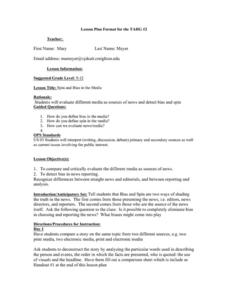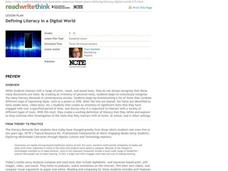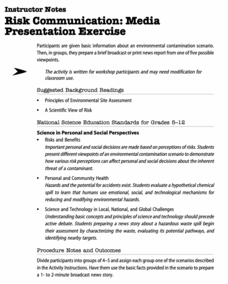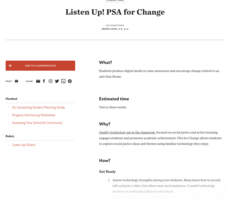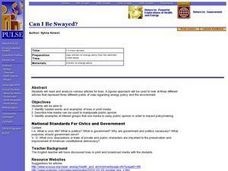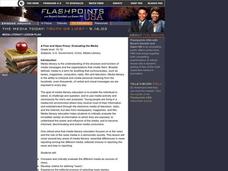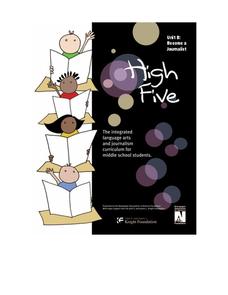Curated OER
Spin and Bias in the Media
Students compare different types of media. For this media comparison lesson, students will assess the where all types of media gets its information by viewing a video of a news story and critiquing it.
ReadWriteThink
Critical Media Literacy: Commercial Advertising
Commercial advertising—we can't get away from it, but do we realize just how often we are being advertised to? With this instructional activity, scholars analyze mass media to identify how its techniques influence our daily lives....
Curated OER
Bias and Crime in Media
Critical thinking and social justice are central themes for this resource on bias and crime in media. The class views and discusses an incisive PSA that highlights assumptions based on race. Small groups read newspaper opinion pieces...
Ontario
Critical Literacy—Media Texts
Media texts convey both overt and implied messages. As part of their study of media, class members analyze the language, form, techniques, and aesthetics in a variety of media texts.
Southern Poverty Law Center
Analyzing How Words Communicate Bias
Words are powerful ... can your class choose them wisely? Scholars evaluate news articles to discover the concepts of tone, charge, and bias during a media literacy lesson. The resource focuses on recognizing implicit information and...
Curated OER
Fighting Fake News
Fake news. Alternative facts. Internet trolls. In an age of Newspeak, it's increasingly important to equip 21st century learners with the skills needed to determine the legitimacy of claims put forth on social media, in print, and in...
Southern Poverty Law Center
Analyzing Gender Stereotypes in Media
Why might toy advertisers use gender stereotypes to sell their products? Young people think critically about media messages and its role in gender stereotyping with a thought-provoking lesson.
Crabtree Publishing
Why Does Media Literacy Matter?
Criticism of news and entertainment journalism is at an all-time high. Help 21st-century learners develop the media literacy skills they need to become critical consumers with a three-lesson guide the looks at persuasive techniques used...
Curated OER
News Journalism Across the Media: Introduction
Although learners are aware of news as information that influences their perceptions of the world, they are often unaware of the various ways to present that information. Encourage them to investigate, discuss, analyze and make valuable...
ReadWriteThink
Defining Literacy in a Digital World
What skills are necessary to interact with different types of text? Twenty-first century learners live in a digital world and must develop a whole new set of skills to develop media literacy. Class members engage in a series of...
Learning for Justice
Beauty is Skin Deep
If you are in need of a lesson on tolerance or the impact of media, this plan could be useful. The class begins with a brainstorming session in which they reflect on their own experiences with bias based on appearance. Next, they...
Curated OER
Media Bias
Students analyze mass media to analyze media bias. In this media bias lesson, students read example situations and definitions about media bias. Students read and discuss how to be aware of media bias.
Curated OER
Media Literacy Vocabulary Lesson
Students participate in an introductory lesson that focuses on communication. The two types of extrapersonal and interpersonal are covered. The lesson uses questions in order to guide the class discussion and writing responses.
Michigan State University
Researching and Compiling Survey Information
Bring Internet research and social issues to your language arts class in this activity. After investigating the topic "Media Violence and How It Affects Teenagers" on the Internet, middle schoolers work in groups to compile their...
Curated OER
News Coverage
Students compare and contrast methods of media coverage. In this media awareness lesson, students keep track of news regarding a world or national issue for the period of 1 week. Students collaborate to describe the type of coverage...
Curated OER
Risk Communication: Media Presentation Exercise
Students work in groups to prepare a brief broadcast or print news report from one of five possible viewpoints about an environmental contamination scenario. Students are given basic information about a chemical spill in a small town and...
Curated OER
Talk Shows
Eighth graders are exposed to different types of media in order to investigate the tendency of being exposed to a set of values that run contrary to conservative values. They role play a television program in order to communicate the...
Teaching Tolerance
Listen Up! PSA for Change
Challenge scholars to speak up about a topic by creating a public service announcement or social media blitz about an issue they feel passionate about. Have them research their issues, then decide the best way to take their messages to...
Facing History and Ourselves
Free Press Makes Democracy Work
A unit study of the importance of a free press in a democracy begins with class members listening to a podcast featuring two journalists, one from a United States public radio station and one from Capetown, South Africa. The lesson,...
Southern Poverty Law Center
Evaluating Online Sources
All sources are pretty much the same, right? If this is how your class views the sources they use for writing or research projects, present them with a media literacy lesson on smart source evaluation. Groups examine several articles,...
Curated OER
Can I Be Swayed?
Students identify loaded words and examples of bias in print media. They describe how media can be used to manipulate public opinion. Students identify examples of interest groups that use media to sway public opinion in order to impact...
Curated OER
Get in the Newspaper Habit
Dive into journalism with your high schoolers! The resources provided here will help your learners write unbiased, clear, and succinct newspaper articles. First they spend time sifting through stacks of articles, filling out a graphic...
Curated OER
A Free and Open Press: Evaluating the Media
Students compare and critically evaluate the different media as sources of news, develop criteria for defining "news", experience the editorial process of selecting news stories and detect bias in news reporting.
Online Publications
Become a Journalist
Explore the newspaper as a unique entity with a detailed and extended unit. The unit requires learners to consider the newspaper's role in democracy, think about ethics, practice writing and interviewing, and examine advertising and news...


